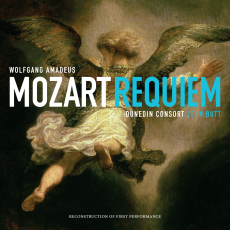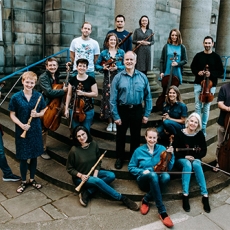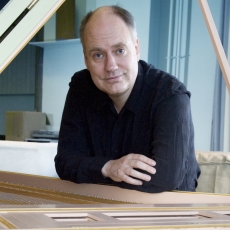Dunedin Consort - Mozart: Requiem - Classical Candor
Given that Mozart never
finished his final composition, the Requiem in D minor, K. 626, we'll never know with absolute certainty
how it might have come out. In the meantime, everybody and his second-uncle Bob
have produced their own version of what it might have been like had Mozart
completed it. Of course, the earliest and most-popular of the completions is
the one by Mozart's own assistant, Franz Xaver Sussmayr, carried out at
Mozart's death, and that's the one we hear on the present disc from Maestro
John Butt and his period-instruments band, the Dunedin Consort (named after a Scottish
castle). However, Butt and his colleagues attempt to go one further than most
other conductors and orchestras by not only offering a historically informed
performance but one they claim comes as close as possible to the first public
performance of the Sussmayr score, performed at a benefit concert for Mozart's
widow, Constanze, in January 1793, just over a year after the composer's death.
Whether
a reconstruction of the music for that early event will appeal to everyone is
another story. There are a lot of people who simply resist all period
performances from all period bands, and there will be yet more people who will
undoubtedly resist this one in particular, given that it utilizes far
more-reduced choral and orchestral forces than used in most other
presentations. The result is a leaner, tauter, and obviously less-grand Requiem than one usually hears. This isn't Giulini or Davis we're
talking about. Not even Marriner, Herreweghe, Hogwood, or Gardiner. Be prepared.
Now,
here's the thing: Despite the smaller forces, instead of the performance
sounding more intimate, the miking is such that the group seems bigger than
they probably really are, negating some of the intimacy that could have
attended the event. This is mainly so in the bigger passages, though, and the
purely orchestral and solo sections are fine.
What's more, despite Butt taking some speedy tempos on
occasion and creating some heady contrasts, the entire performance still seems
fairly conventional. Among the segments that stood out for me were the
"Dies Irae" for its menacing spirit; the "Tuba Mirum,"
"Recordare," and "Lux Aeterna" for their sweet freshness;
and the "Lacrimosa" for its earnest bearing. The rest of the reading
sounds OK but not necessarily more compelling than anyone else's.
In
addition to the Requiem the program contains Mozart'sMisericordias Domini in D minor, K. 222, "Offertorium de tempore," recently
identified by researcher David Black as one of the composer's final works and
using basically the same forces as the Requiem. And
we also get two reconstructions of music performed at Mozart's own Requiem Mass
of December 10, 1791, five days after his death: the "Requiem
Aeterna" and "Kyrie." I actually enjoyed them more than I did
the Requiem itself.
Philip
Hobbs produced and recorded this hybrid stereo-multichannel SACD for Linn Records
in September 2013 at Greyfriar's Kirk, Edinburgh, UK. I listened in the SACD
two-channel stereo mode and found the sound generally good, if not quite up to
Linn's highest standards. It displays some very smooth, clear, natural
orchestral sonics, with a modest sense of presence, air, and dimensionality in
the instruments. The choir and soloists, however, tend to get a bit too bright
for my taste and a little congested, too, in the loudest passages. The hall's
inherent ambient bloom may have gotten in the way of the cleanest vocals, I
don't know. In any case, it's not a huge concern and may even favor more
reticent playback systems. The miking, as I said earlier, is also a tad close
and the dynamics quite wide, making the smallish ensemble seem larger, though
not necessarily more imposing, for it.


